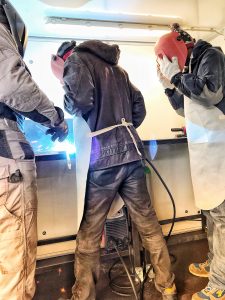Here in Italy, the immigration issue dominated our recent national elections. The parties that seemed to garner the most votes were those who had the strongest—and often most negative—responses to the flood of people arriving on our shores. One well-known politician called the refugees a “ticking time bomb” and “promised” to expel the 600,000 newly arrived people. Certain politicians were able to win the populist votes by creating a sense of impending (but imaginary) threat.
The public in Italy has spoken: “These refugees (war-torn or economic) are not human beings to be welcomed. They are a problem to be expelled.”
But into the winds of rising hostility, the gospel advances.
Local Context
Years ago, our small missional communities asked the Lord to guide and use us for the expected wave of migrants. We had little idea what that would look like. No one knew how this mass migration would change the face of Italy.
Into the winds of rising hostility, the gospel advances.

In early 2016, we were introduced to a tall, young, happy Nigerian man seeking work in our city. He pleaded with us to visit him in the refugee camp, which had been established in a medieval convent on the mountainside. Intrigued, some of our church members visited and found a mix of old dormitories and disaster relief tents housing more than 200 men from a dozen nations. The migration wave had begun.
By God’s grace, our Nigerian friend later became our Nigerian brother. At his baptism, he testified that one of our Italian believers was the first white man to ever hug him. It wasn’t a rescue or social worker who hugged him after his perilous journey, but an Italian believer demonstrating a true welcome, born from the gospel of grace.
As we continued spending time in the refugee camps, we learned of the seemingly endless needs. We now have a team that serves weekly at two different camps of up to 800 refugees. The team’s areas of service include bicycle repair, Italian-language training, counseling, document assistance, job placement, technical skills training, and event planning.
In addition to this training, our church holds two weekly Bible studies in the camps. We offer rides to our church services every Sunday. We’ve provided the migrant men with Bibles, clothes, bed linens, blankets, bicycles, and more.
Life Labs

Our newest and most exciting project—“Life Labs”—was inaugurated earlier this month. This project—which has been in the works for 17 months—seeks to train men in welding and soldering. Our first mobile laboratory will serve as an industrial classroom inside the refugee camps.
Metalwork is in high demand in our regions, and the majority of the men love to work with their hands. But without the necessary industrial, linguistic, safety, and technical training, they won’t be qualified to be hired by Italian factories.
So, together with certified Italian teachers, the migrant men learn both concepts and practices during their two-year stay in the camp. The level of enthusiasm and morale is incredibly high. And the dignity and sense of worth the training course provides makes it a valuable investment.
As we train people, we’re able to develop deep friendships, which then gives us great opportunities for gospel witness.
Our Dual ‘Crisis’
From a humanitarian point of view, the flood of migrants is a crisis. The sheer number of migrants pouring into Italy requires a strong infrastructure, which doesn’t bode well for a nation already under immense pressure. Migrants arrive desperate for food and shelter, but these aren’t their only needs. They also bring deep spiritual and social burdens.
Migrants arrive desperate for food and shelter, but these aren’t their only needs. They also bring deep spiritual and social burdens.
We’ve encountered a variety of problems that only reinforce the refugee stereotype and excuse the general populace from needing to care. Indeed, we regularly see the destructive practices and effects of ancestor worship, mental and physical trauma, war, spiritism, prosperity theology, greed, laziness, distrust, human trafficking, loss/abandonment of family, illiteracy, sexual deviancy, theft, paralyzing fear, and a myriad of other issues.
On top of all this, many of the migrants will be forced to leave the camps in the coming months when their transition time is complete. This means that while they may have short-term legal permission to stay in Italy, they will find themselves woefully unqualified for Italian standards of employment.
Sadly, the plight of migrants only continues to worsen after they’re forced to leave the camps. They’re unable to rent a home, provide for themselves, support their families back home, or bring their families to join them in Italy.
Rather than viewing the refugees as a crisis, we see this as a God-given impetus to plant churches in areas where both Italians and foreigners welcome each other as family and fellow-exiles in Christ.
As Christians, we know that a migrant’s greatest need (as is the case with all of us) is for Christ. That’s why we need healthy, gospel-centered churches proclaiming Christ as they love and welcome these migrants streaming into Italy. We are more than a social relief program; churches ought to be the “spiritual camp” for all “refugees” displaced by sin, no matter their background or color of skin.
Wonderful Crisis
Rather than viewing the refugees as a crisis, therefore, we see this as a God-given impetus to plant churches in areas where both Italians and foreigners welcome each other as family and fellow-exiles in Christ. Only the power of the gospel can truly bring nationals and foreigners together. In Christ, the two can become one (Eph. 2:14).
In fact, our church-planting network—“Impatto” (Acts 29 Italy)—is currently training and assessing men who were once immigrants themselves, and are now answering the call to plant churches. These men long to see the church welcoming migrants as they arrive.
May Christ be honored as churches are planted across Italy in the midst of this wonderful crisis.
Related:
- The Greatest Gospel Opportunity in a Generation—Lost (James Misner)
Is there enough evidence for us to believe the Gospels?
 In an age of faith deconstruction and skepticism about the Bible’s authority, it’s common to hear claims that the Gospels are unreliable propaganda. And if the Gospels are shown to be historically unreliable, the whole foundation of Christianity begins to crumble.
In an age of faith deconstruction and skepticism about the Bible’s authority, it’s common to hear claims that the Gospels are unreliable propaganda. And if the Gospels are shown to be historically unreliable, the whole foundation of Christianity begins to crumble.































